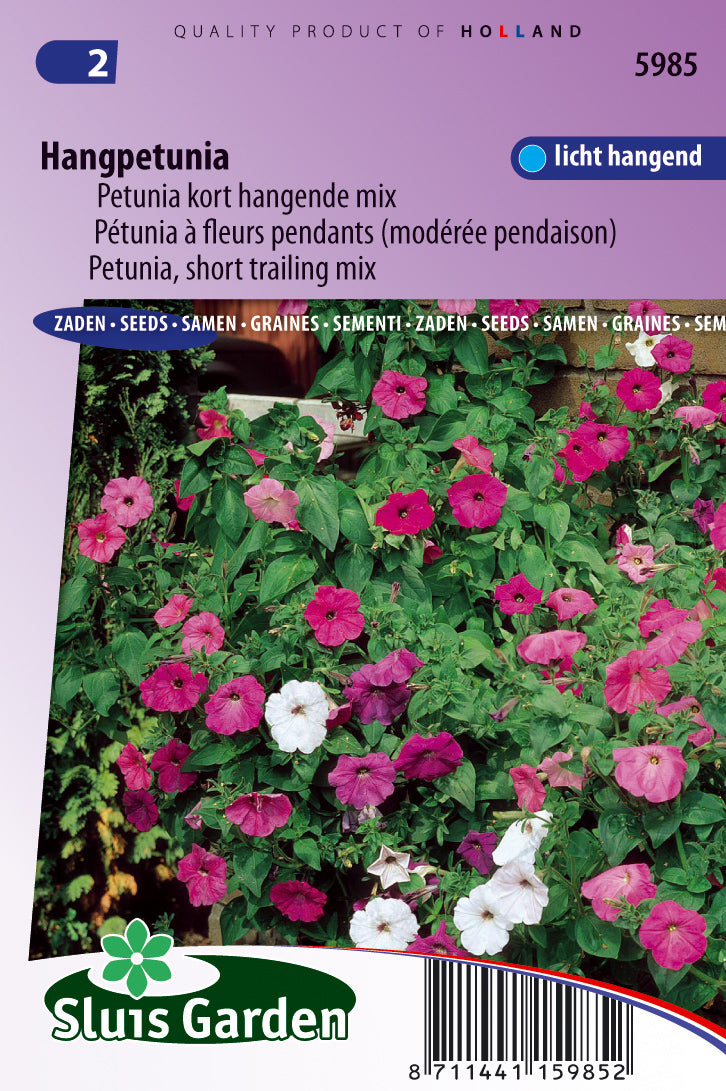1
/
of
1
Petunia pendula balcony mix
Petunia pendula balcony mix
Regular price
1.350 KWD
Regular price
Sale price
1.350 KWD
Unit price
/
per
Shipping calculated at checkout.
Couldn't load pickup availability
Petunia pendula, commonly known as Trailing Petunia or Cascading Petunia, is a popular choice for hanging baskets, containers, and balconies due to its trailing growth habit and colorful blooms. Here's a guide on how to grow Petunia pendula 'Balcony Mix':
**1. Selecting the Right Location:**
- Choose a sunny location for your balcony where the Petunias will receive at least 6-8 hours of direct sunlight each day.
**2. Container Selection:**
- Use hanging baskets or containers with good drainage holes. Hanging baskets work well for the trailing habit of Petunia pendula.
**3. Soil:**
- Use a well-draining potting mix enriched with organic matter. Ensure good aeration for healthy root development.
**4. Planting:**
- Plant the Petunia pendula 'Balcony Mix' in the spring after the last frost date in your region.
- Space the plants according to the recommendations on the seed packet or plant tag.
**5. Watering:**
- Keep the soil consistently moist but not waterlogged. Water the plants when the top inch of the soil feels dry.
- Water at the base of the plants to avoid wetting the foliage, which can lead to diseases.
**6. Fertilizing:**
- Use a balanced, water-soluble fertilizer every 2-4 weeks during the growing season. Follow the recommended dosage on the fertilizer package.
- Over-fertilization can lead to excessive foliage growth, so be mindful of the application rates.
**7. Deadheading:**
- Remove faded or spent flowers regularly to encourage continuous blooming. Deadheading also helps maintain a neat appearance.
**8. Pruning:**
- Trim back leggy or straggly growth to encourage branching and a fuller appearance.
- Pinch the tips of young plants to promote bushiness.
**9. Mulching:**
- Apply a layer of mulch on the soil surface to retain moisture and suppress weed growth.
**10. Support:**
- Trailing Petunias often do not need additional support. However, if your balcony is exposed to strong winds, consider providing some protection to prevent damage.
**11. Pests and Diseases:**
- Keep an eye out for common pests like aphids and spider mites. Treat infestations promptly.
- Provide good air circulation to minimize the risk of fungal diseases.
**12. Winter Care:**
- Petunia pendula is typically grown as an annual. If you want to try overwintering, take cuttings before the first frost and root them indoors. Alternatively, treat them as annuals and replant the following spring.
Always check for specific care recommendations provided by the supplier or breeder, as different varieties may have unique characteristics or care requirements. Adjust your care routine based on your local climate and the specific conditions of your balcony.
**1. Selecting the Right Location:**
- Choose a sunny location for your balcony where the Petunias will receive at least 6-8 hours of direct sunlight each day.
**2. Container Selection:**
- Use hanging baskets or containers with good drainage holes. Hanging baskets work well for the trailing habit of Petunia pendula.
**3. Soil:**
- Use a well-draining potting mix enriched with organic matter. Ensure good aeration for healthy root development.
**4. Planting:**
- Plant the Petunia pendula 'Balcony Mix' in the spring after the last frost date in your region.
- Space the plants according to the recommendations on the seed packet or plant tag.
**5. Watering:**
- Keep the soil consistently moist but not waterlogged. Water the plants when the top inch of the soil feels dry.
- Water at the base of the plants to avoid wetting the foliage, which can lead to diseases.
**6. Fertilizing:**
- Use a balanced, water-soluble fertilizer every 2-4 weeks during the growing season. Follow the recommended dosage on the fertilizer package.
- Over-fertilization can lead to excessive foliage growth, so be mindful of the application rates.
**7. Deadheading:**
- Remove faded or spent flowers regularly to encourage continuous blooming. Deadheading also helps maintain a neat appearance.
**8. Pruning:**
- Trim back leggy or straggly growth to encourage branching and a fuller appearance.
- Pinch the tips of young plants to promote bushiness.
**9. Mulching:**
- Apply a layer of mulch on the soil surface to retain moisture and suppress weed growth.
**10. Support:**
- Trailing Petunias often do not need additional support. However, if your balcony is exposed to strong winds, consider providing some protection to prevent damage.
**11. Pests and Diseases:**
- Keep an eye out for common pests like aphids and spider mites. Treat infestations promptly.
- Provide good air circulation to minimize the risk of fungal diseases.
**12. Winter Care:**
- Petunia pendula is typically grown as an annual. If you want to try overwintering, take cuttings before the first frost and root them indoors. Alternatively, treat them as annuals and replant the following spring.
Always check for specific care recommendations provided by the supplier or breeder, as different varieties may have unique characteristics or care requirements. Adjust your care routine based on your local climate and the specific conditions of your balcony.
Share

